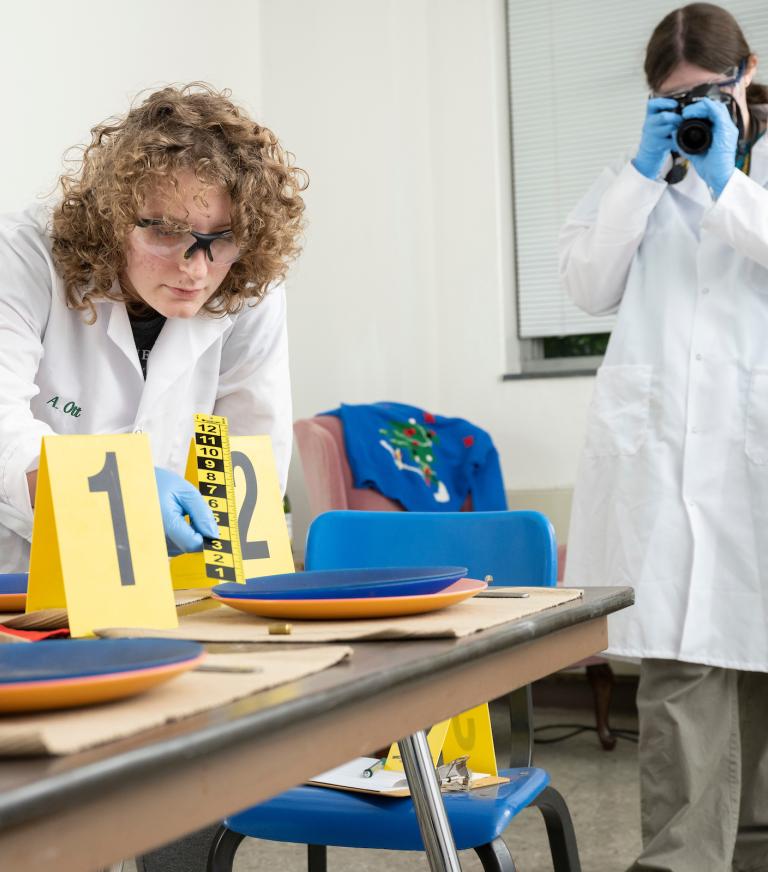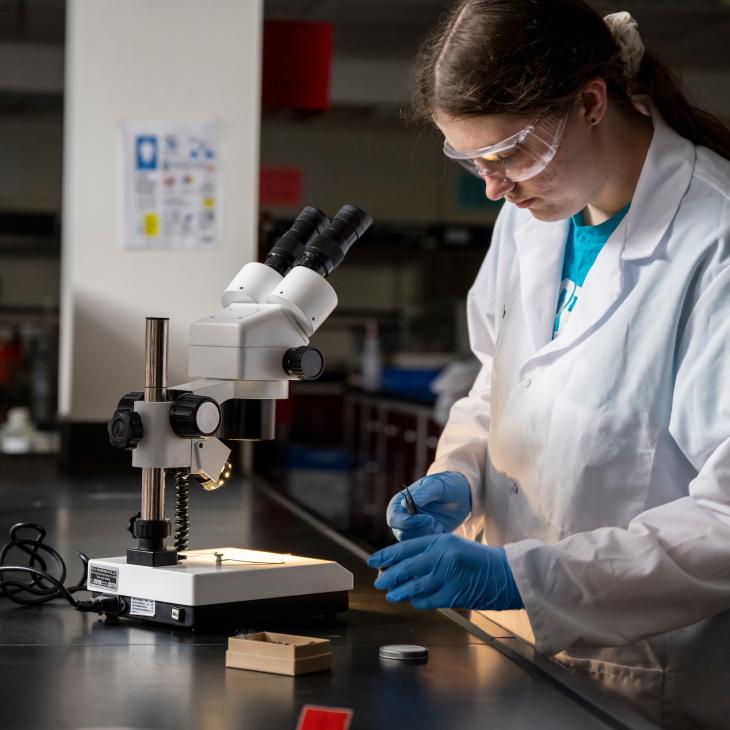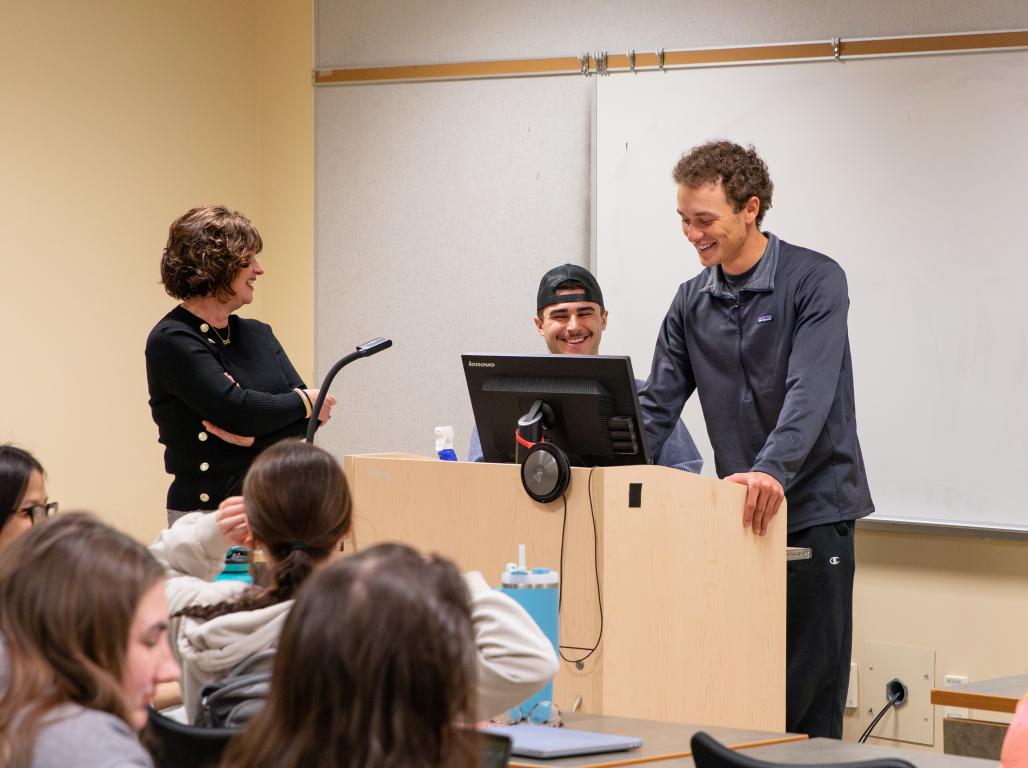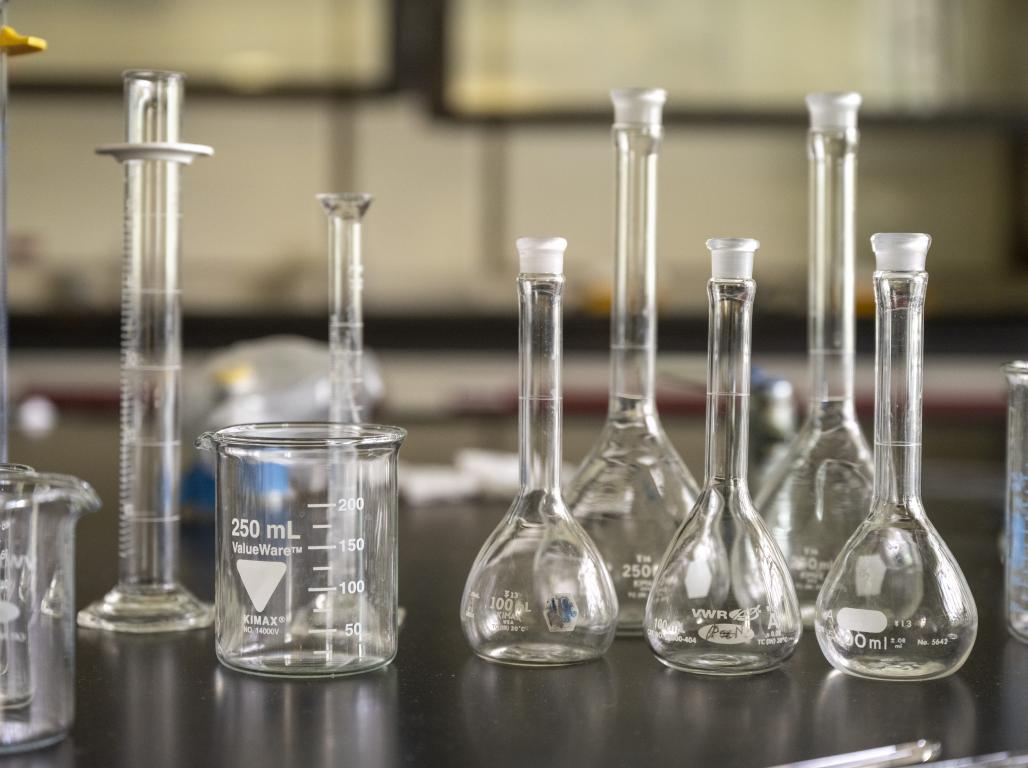Forensic Chemistry

Program Type
B.S.
Est. Time to Complete
4 Years
School
Kinsley School of Engineering, Sciences and Technology
Delivery Mode
On Campus

Be the expert, from the lab to the courtroom.
The criminal justice field involves more than police officers and lawyers. Forensic chemists also play an important role in investigations. They specialize in analyzing evidence, and they use scientific processes to draw conclusions about a crime.
York College’s major in Forensic Chemistry places you at a distinct advantage for careers requiring both a robust understanding of chemistry and problem-solving skills. You’ll get hands-on experience with state-of-the-art laboratory equipment, and you’ll work closely with a faculty of expert chemists who will guide you through research and project-based learning.
Employment opportunities in forensic chemistry are projected to grow by 14% from 2019 to 2029 — a much faster rate than most other occupations. As a result, the U.S. Bureau of Labor Statistics expects that 2,400 new forensic chemistry jobs will be created during this 10-year period. In the Forensic Chemistry program at York College, you’ll build a strong foundation for a future in this quickly growing field.
Majoring in Forensic Chemistry
The Forensic Chemistry major offers a wide variety of required classes, electives, and real-world learning opportunities. These include:
- FCM 210: Criminalistics
- FCM 362: Crime Scene Processing
- FCM 392: Forensic Chemistry
- FCM 394: Forensic Biology
- CHM 455: Professional Practice in Chemistry and Forensic Chemistry
Career Opportunities & Benefits
No matter your interests, York College’s experienced faculty will guide you toward real-world opportunities that allow you to build a strong professional network in your preferred subject area.
These are just a few of the many career opportunities available to graduates of the Forensic Chemistry program:
- Forensic Science Technician
- Crime Lab Chemist
- Researcher
- Wildlife Forensic Scientist
- Forensic Chemist
- Toxicologist
Forensic Chemistry Salary Information
With a Forensic Chemistry degree, you’ll develop the skills needed to work in a variety of areas. About 90% of forensic chemists work in labs associated with a federal, state, or local police department; medical examiner’s office; forensic services lab; or branch of the Federal Bureau of Investigation (FBI). To work in these labs, you’ll need an undergraduate degree in forensic science or a related field. Lab managers or supervisors may also require a master’s degree.
The median salary for forensic chemistry jobs is around $60,000. Entry level trainee positions may start at a lower rate of pay ($27,000-$44,000), but top salaries can reach to nearly $130,000 per year with advanced degrees or work experience.
Benefits of a Degree in Forensic Chemistry
In the York College Forensic Chemistry program, you’ll learn to identify physical evidence and use the power of science to discover how it ended up on a scene. A major benefit of a degree in forensic chemistry is the opportunity you’ll have to support justice. You’ll use science to solve crimes and bring the truth to light. If this combination of scientific analysis and criminology sounds interesting to you, a career in forensic chemistry may be a great fit.
- Participate in the criminal justice process from a behind-the-scenes research perspective.
- Do exciting work! No two days are the same.
- Help to put criminals behind bars, based on forensic evidence and expert testimony.
Internships & Work Experience
York College’s state-of-the-art facilities allow you access to the types of equipment used by professional forensic scientists — so when you start your first job after graduating, you’ll feel comfortable in the lab from day one.
During your senior year, you’ll also complete a forensic laboratory experience (CHM 455: Professional Practice in Chemistry and Forensic Chemistry) and either an internship or independent study in the field of forensic chemistry.
Mentorship & Community
As a Forensic Chemistry major, you’ll work closely with faculty who are practitioners in their field. Students often conduct research side- by-side with professors, even as undergraduates.
You’ll also have opportunities to participate in scholarly events and networking. Forensic Chemistry students have attended conferences around the country — and around the world! Past trips have included global climate talks in Paris, in addition to other domestic and international travel.
Membership in the Chemistry Society is also an option for students in the Forensic Chemistry program. This student organization provides a social network for York College scientists, featuring peer support, field trips, and special projects.
High-Demand Skills
Skills to be a Forensic Chemist
Outside of the required scientific abilities, a background in criminology is useful for many careers in forensic chemistry. Employers also value forensic chemists with skills in public speaking and technical writing. This job is about more than just scientific analysis; it also involves writing detailed reports and objectively testifying in court during criminal trials.
Best Minors for a Degree in Forensic Chemistry
One of the best minors for a degree in forensic chemistry is criminal justice/criminology. A good forensic chemist may often assist law enforcement or others in the criminal justice system as they analyze evidence. A minor in criminal justice, paired with a degree in forensic chemistry, will ensure you have necessary knowledge in both the sciences and the law.
Forensic Chemistry Courses
Your class schedule will include core courses for your major, Gen Next general education classes, and electives.
| Course Name | Course Code | Credits |
|---|---|---|
| Criminalistics | FCM 210 | 4 Credits |
| Crime Scene Processing | FCM 362 | 3 Credits |
| Forensic Chemistry | FCM 392 | 4 Credits |
| Forensic Biology | FCM 394 | 4 Credits |
| Professional Practice in Chemistry and Forensic Chemistry | CHM 455 | 2 Credits |
Careers in Forensic Chemistry
A bachelor's degree in Forensic Chemistry opens up a variety of career opportunities. Some of your options may include:
Forensic Science Technician
Crime Lab Chemist
Researcher
Wildlife Forensic Scientist
Forensic Chemist
Toxicologist

Build your dream career, one day at a time.
This is day one. From your first semester on campus through graduation day, York College offers expert advice, professional development opportunities, and personalized support to help you navigate the choices that influence your future.
Explore resources for a successful college experience:
Meet the Faculty
View All FacultyForensic Chemistry in Action
View All NewsRelated Programs
Biochemistry
York College of Pennsylvania’s interdisciplinary BS in Biochemistry degree program is a gateway to a multitude of post-graduate opportunities in biomedical science, healthcare, academics, industry, and public health.
Criminology and Criminal Justice
A bachelor’s degree in Criminology and Criminal Justice does more than ready you for a future in law enforcement. You’ll learn about the causes of crime, as well as ways to help reduce law-breaking. You’ll explore ethical codes of behavior and the legal frameworks that guide professionals in this high-demand field.
Medical Laboratory Science
From collecting data to analyzing laboratory results, students in York College’s Medical Laboratory Science program are gaining the skills they need to make an impact in the world of medicine. Whether you see yourself developing new medications for the pharmaceutical industry, conducting medical research in a hospital lab, or finding new ways to bring comfort to animals through veterinary studies – York College can give you the tools to get there.








